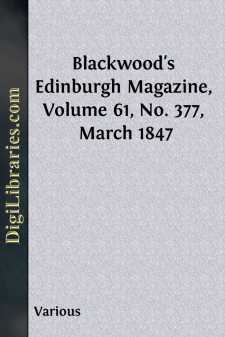Categories
- Antiques & Collectibles 13
- Architecture 36
- Art 48
- Bibles 22
- Biography & Autobiography 813
- Body, Mind & Spirit 142
- Business & Economics 28
- Children's Books 17
- Children's Fiction 14
- Computers 4
- Cooking 94
- Crafts & Hobbies 4
- Drama 346
- Education 46
- Family & Relationships 57
- Fiction 11829
- Games 19
- Gardening 17
- Health & Fitness 34
- History 1377
- House & Home 1
- Humor 147
- Juvenile Fiction 1873
- Juvenile Nonfiction 202
- Language Arts & Disciplines 88
- Law 16
- Literary Collections 686
- Literary Criticism 179
- Mathematics 13
- Medical 41
- Music 40
- Nature 179
- Non-Classifiable 1768
- Performing Arts 7
- Periodicals 1453
- Philosophy 64
- Photography 2
- Poetry 896
- Political Science 203
- Psychology 42
- Reference 154
- Religion 513
- Science 126
- Self-Help 84
- Social Science 81
- Sports & Recreation 34
- Study Aids 3
- Technology & Engineering 59
- Transportation 23
- Travel 463
- True Crime 29
Blackwood's Edinburgh Magazine, Volume 61, No. 377, March 1847
by: Various
Description:
Excerpt
In order to deal effectively with pauperism, it is necessary to know the causes which lead to the impoverishment of individuals and masses of individuals, and to be familiar with the condition, manners, customs, habits, prejudices, feelings, and superstitions of the poor.
We do not propose to institute an elaborate inquiry into the causes of pauperism, or to make the topic a subject of separate investigation. Our chief object will be, to collect into classes those of the poor who are known, from personal observation, to become chargeable to parishes, which process will afford abundant scope for remark upon the causes which led to their impoverishment. We may require the company of the reader with us in the metropolis for a short space, and may satisfy him that he need not travel ten miles from his own door in search of valuable facts, and at the same time convince him that pauperism is not that simple compact evil which many would wish him to believe. We might also show that, in the metropolis and its suburbs, there exist types of every class of poor that can be found in the rural and manufacturing districts of England; just as it might be shown, that its inhabitants consist of natives of every county in the three kingdoms. Its fixed population, according to the quarter in which they live, would be found to resemble the inhabitants of a great town, a cathedral city, or a seat of manufactures. And that portion of its inhabitants which may be regarded as migratory, would complete the resemblance, except that the shadows would be deeper and the outline more jagged. These persons make London their winter-quarters. At other seasons they are employed by the farmer and the grazier. It is a fact, that the most onerous part of the duties of the metropolitan authorities are those which relate to these migratory classes. Among them are the most lawless and the most pauperised of the agricultural districts. Others, during the spring, summer, and autumn months, were engaged, or pretend that they were engaged (and the statement cannot be tested,) in the cutting of vegetables, the making of hay, the picking of pease, beans, fruit, and hops, and in harvest work. Or they travelled over the country, frequenting fairs, selling, or pretending to sell, knives, combs, and stay-laces. Or they were knife-grinders, tinkers, musicians, or mountebanks. As the winter approaches, they flock into the town in droves. There they obtain a precarious subsistence in ways unknown; some pick up the crumbs that fall from the rich man’s table, others overcrowd the workhouses. It would lead to many curious and useful results if this matter were fully investigated. The reader’s company is not, however, required for this purpose; at the same time, the previous remarks may, in some measure, prepare his mind for the consideration of kindred topics. It may introduce a train of reflection, and prompt him to inquire whether the wandering habits of these outcasts have been in any degree engendered by the strict workhouse system and workhouse test enforced in their native villages, by the destruction of cottages, and the breaking up of local associations, and whether these habits have been fostered by the facilities with which a bed and a mess of porridge may be obtained at the unions, without inquiry into their business and object in travelling.
Let us steer our course along the silent “highway,” the Thames, and make inquiries of the few sailor-looking men who may still be seen loitering at the several “stairs;” we shall learn that not many years since these narrow outlets were the marts of a thriving employment, and that there crowds of independent and privileged watermen plied successfully for fares....












